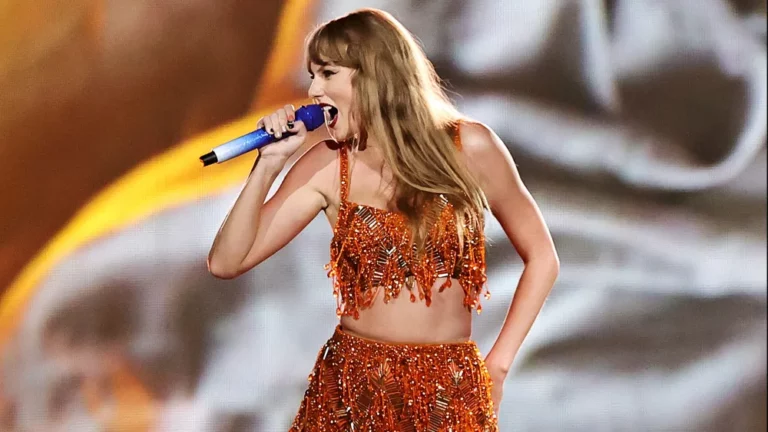Hollywood loves to repeat success, and now more than ever it needs to. If there’s a promising way to draw people into movie theaters that the industry doesn’t capitalize on, it will only be colluding in the decay of its own future. So when I came out of “Taylor Swift: The Eras Tour,” having experienced, for the first time in a while, what it was like a share a concert film with an ecstatic audience, one of my first thoughts was, “How could they do this again?”
You might say that’s a silly question, since it has one obvious answer: They can’t. There is only one Taylor Swift, the most epic global pop superstar since the Michael Jackson of the “Thriller” era. And there is only one Taylor Swift fan base. Until “The Eras Tour,” no concert movie in history has made this kind of money (though “Woodstock,” which took in $34.5 million in 1970 dollars, came closer than you might think). And maybe no concert movie of the future ever will. Even as the monster success of “The Eras Tour” has been the financial savior of the fall movie season, it would be easy to celebrate that success and still consider it a fantastic anomaly.
But I think the real answer to “How could they do this is again?” is actually, “There are several ways.” Yes, there is only one Taylor Swift. But there is also only one Beyoncé, and she’s got her own concert film, “Renaissance: A Film by Beyoncé,” opening Dec. 1. It should prove a major draw, if not quite in that Taylorsphere next level. Beyond Beyoncé, there’s more than one strategy to bring pop-music performance films back into theaters in a way that helps the industry and redefines the concert movie as a thriving genre.
There are 52 weeks in a year, and every one of those weeks that features a wide-release movie that people are lining up to see goes into the plus column of sustaining the theatrical experience. Sometimes that smash #1 release of the week is a Marvel adventure, or a “Fast and Furious” or Bond or “Jurassic Park” or “Mission: Impossible” thriller, or some other franchise blockbuster. Sometimes it’s an animated fantasy, or a bloodbath horror film that pushes enough buttons to connect. Sometimes it’s even a movie, like “Oppenheimer,” that critics love. In that light, I propose the following: For two or three of those 52 weeks, why couldn’t the hit release of the week be a concert film that legions of fans are excited enough to come out and see?
One obvious answer is: That hasn’t happened in quite a while. The concert movie never went away, but looking past the classics of the 20th century (“Woodstock,” “Gimme Shelter,” “The Last Waltz,” and “Stop Making Sense,” which is enjoying a successful 40th anniversary revival), it peaked as a commercial genre in the late 2000s — the period that gave us “U2 3D” (2008), “Hannah Montana and Miley Cyrus: Best of Both Worlds Concert” (2008), “Michael Jackson’s This Is It” (2009), “Justin Bieber: Never Say Never” (2011), “Katy Perry: Part of Me” (2013), and Martin Scorsese’s Rolling Stones film, “Shine a Light” (2008). Since then the genre has faded, becoming more of a straight-to-streaming, below-the-radar thing, though two years ago Questlove’s “Summer of Soul (…Or, When the Revolution Could Not Be Televised)” showed us the magic that still lives in the vaults.
So if the concert film faded of its own accord, becoming more of a home-viewing niche, why do I think it could come back? “Taylor Swift: The Eras Tour” points to exactly how that could happen. In a way, it comes down to one word: currency.
“The Eras Tour” would surely have been a blockbuster whenever it was released — like, say, had it come out next summer. But of all the ways it broke the paradigm (2-hour-and-49-minute running time; released not by a studio but directly through AMC Theatres), I’d argue that the most striking, and commercially significant, is the fact that it’s being released right at the end of the first leg of the Eras Tour — and, in fact, the tour will continue after the film’s run. This greatly enhances the film’s inherent value. It’s not some live video broadcast (it’s a honed and polished cinematic experience), yet it offers the opportunity to see Taylor Swift in concert in the thick of the buzz of her tour. As someone who never snagged tickets to the show, I took my daughters to see the movie, and we felt like it was something more than just the next best thing. The timely element, the nowness of it all, added to the excitement.
This could become a new model. It would need to be worked out with concert promoters, but in an age when concert-ticket prices are off the hook, imagine what a draw it would be to have concert movies in theaters right on the heels of the tours they’re capturing. As with Swift, many fans would want to go back and see the concert again with the intimacy that movies can offer, and tons of fans who hadn’t made it to the show could see the movie instead. You could easily imagine that model working with an artist like Harry Styles, or with Elton John’s recent Farewell Yellow Brick Road tour.
But there’s another way I believe the concert-film genre can be rethought. The roster of 21st-century concert-film hits I listed above included a number of teen-pop acts (Justin Bieber, Miley back when she was Hannah), and that’s part of Taylor Swift’s demo as well. So it may seem as if, short of someone like Harry Styles, there aren’t too many music acts around who could actually woo people out to movie theaters on a mass scale. But I think that perception is disconnected from something that’s been a fundamental reality of the concert world for a long time: It is driven, to a surprisingly large degree, by classic boomer and now Gen-X nostalgia.
The second biggest concert tour of 2023, after the Eras Tour, has been Bruce Springsteen’s. Also in the top 10 is the Red Hot Chili Peppers — who, at this point, are selling ’90s nostalgia. (I don’t mean that as a knock on them; I adore the Chili Peppers. But that’s what it is.) I could easily see a Springsteen film bringing in a large audience, though with one caveat: It would work only if the industry committed to marketing it as a true event. Same for the Chili Peppers — or another act that’s done well in concert recently, and whose appeal extends back 35 years: Guns N’ Roses. Let me use my own stodgy self as an example of something. I’m someone who worshipped Guns N’ Roses back in the day but would probably not want to go to one of their reunion shows. Frankly, it would be too much of an ordeal. But would I go to a Guns N’ Roses concert movie? You bet. And so, I bet, would a lot of other aging metal-bash fans. Speaking of metal, a Metallica concert film, done right, would be a major draw.
Yet pulling away from rock nostalgia, there are a multitude of other acts, old and new, that one could easily envision luring in viewers for a timely, well-produced, savvily marketed concert-film experience. I’m thinking of artists like Coldplay, Lizzo, Billy Joel, Pink, The Weeknd, the reunited NSYNC, Billie Eilish, Bad Bunny, Adele, Ed Sheeran, Public Enemy…and Madonna! And how about the U2 Sphere shows or ABBA’s hologram concerts? How many viewers worldwide, who don’t have access to those shows, would see the movie version in a heartbeat? No one can say for sure. What I do know is that concert films, for too long, have been stuck in a box. “The Eras Tour” busted that box right open. Now it’s time to start thinking outside it
![]() Post Views: 2,073
Post Views: 2,073

